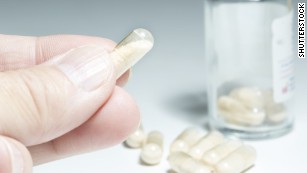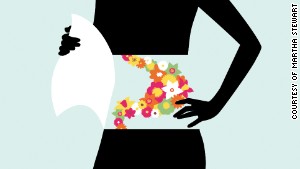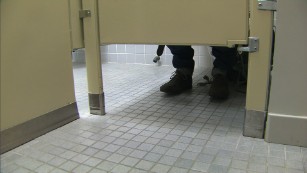What are probiotics? 01:16
If you take antibiotics, there's a good chance you'll also get diarrhea.
Antibiotics kill harmful bacteria that cause disease. But they also cause collateral damage to the microbiome, the complex community of bacteria that live in our gut. This results in a profound, though usually temporary, depletion of the beneficial bacteria.
One popular strategy to mitigate the disruption is to take a probiotic supplement containing live bacteria during, or following, a course of antibiotics.
The logic is simple: beneficial bacterial in the gut are damaged by antibiotics. So why not replace them with the "beneficial" bacterial strains in probiotics to assist gut bacteria returning to a "balanced" state?
But the answer is more complicated.
There is currently some evidence that taking probiotics can prevent antibiotic-associated diarrhea. This effect is relatively small, with 13 people needing to take probiotics for one episode of diarrhea to be averted.
But these studies have often neglected to evaluate potential harms of probiotic use and haven't looked at their impact on the wider gut microbiome.
Pros and cons of probiotics
The assumption that there is little downside to taking probiotics was challenged in a recent Israeli study.
The participants were given antibiotics and split into two groups: the first group was given an 11-strain probiotic preparation for four weeks; the second was given a placebo, or dummy pill.
The researchers found the antibiotic damage to the gut bacteria of those in the first group allowed the probiotic strains to effectively colonise the gut. But this colonization delayed the normal recovery of the microbiota, which remained perturbed for the entire six month study period.
In contrast, the microbiota of the second group returned to normal within three weeks of finishing antibiotics.
This research exposes a perhaps unexpected truth: we still don't know what types of bacteria are truly beneficial or even what constitutes a healthy microbiome.
The answer is unlikely to be that individual bacterial strains are particularly helpful.
It's more likely a diverse community of thousands of different types of microbes working together can provide health benefits. This microbial community is as individual as each one of us, meaning there is not just one configuration that will result in health or illness.
So, it's unlikely that the addition of one or even 11 strains of bacteria in a probiotic could somehow balance this complex system.
A more effective (but less palatable) alternative?
The Israeli study also explored an alternative approach to microbiome restoration.
One group of participants had their own stool collected and frozen prior to antibiotic treatment. It was then re-instilled into their gut at the end of the antibiotic therapy.
This treatment, known as autologous fecal transplantation, was able to restore the microbiome to original levels after just eight days. The other group took 21 days to recover.
This approach has also been shown to effectively restore the gut microbiome following combined antibiotic and chemotherapy treatment. These patients are predictably at risk of serious complications, such as bloodstream infection, as a result of microbiome disruption.
Research currently underway will help us understand whether microbiome restoration with autologous fecal transplantation will translate into tangible benefits for these patients.
But such an approach would not be a realistic option for most people.
Feed the good bacteria
Get CNN Health's weekly newsletter
Sign up here to get The Results Are In with Dr. Sanjay Gupta every Tuesday from the CNN Health team.
A more practical strategy to aid recovery is to provide the good bacteria in your gut with their preferred source of nutrition: fiber. Fibrous compounds pass undigested through the small intestine and into the colon, where they act as fuel for bacterial fermentation.
So if you're taking antibiotics or have recently finished a course, make sure you eat plenty of vegetables, fruit and whole grains. Your gut bacteria will thank you for it.



Comments
Post a Comment